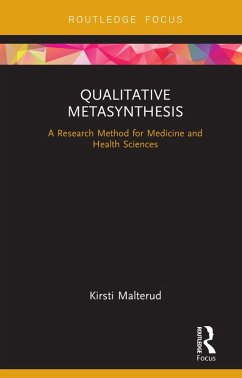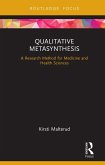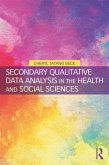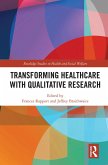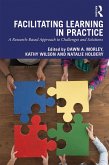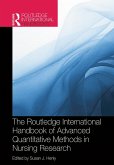Kirsti Malterud
Qualitative Metasynthesis (eBook, PDF)
A Research Method for Medicine and Health Sciences
21,95 €
21,95 €
inkl. MwSt.
Sofort per Download lieferbar

11 °P sammeln
21,95 €
Als Download kaufen

21,95 €
inkl. MwSt.
Sofort per Download lieferbar

11 °P sammeln
Jetzt verschenken
Alle Infos zum eBook verschenken
21,95 €
inkl. MwSt.
Sofort per Download lieferbar
Alle Infos zum eBook verschenken

11 °P sammeln
Kirsti Malterud
Qualitative Metasynthesis (eBook, PDF)
A Research Method for Medicine and Health Sciences
- Format: PDF
- Merkliste
- Auf die Merkliste
- Bewerten Bewerten
- Teilen
- Produkt teilen
- Produkterinnerung
- Produkterinnerung

Bitte loggen Sie sich zunächst in Ihr Kundenkonto ein oder registrieren Sie sich bei
bücher.de, um das eBook-Abo tolino select nutzen zu können.
Hier können Sie sich einloggen
Hier können Sie sich einloggen
Sie sind bereits eingeloggt. Klicken Sie auf 2. tolino select Abo, um fortzufahren.

Bitte loggen Sie sich zunächst in Ihr Kundenkonto ein oder registrieren Sie sich bei bücher.de, um das eBook-Abo tolino select nutzen zu können.
Qualitative Metasynthesis presents a research method developed for upcycling and synthesis of qualitative primary studies, aimed at researchers within medicine and health sciences.
- Geräte: PC
- ohne Kopierschutz
- eBook Hilfe
- Größe: 1.64MB
Andere Kunden interessierten sich auch für
![Qualitative Metasynthesis (eBook, ePUB) Qualitative Metasynthesis (eBook, ePUB)]() Kirsti MalterudQualitative Metasynthesis (eBook, ePUB)21,95 €
Kirsti MalterudQualitative Metasynthesis (eBook, ePUB)21,95 €![Secondary Qualitative Data Analysis in the Health and Social Sciences (eBook, PDF) Secondary Qualitative Data Analysis in the Health and Social Sciences (eBook, PDF)]() Cheryl Tatano BeckSecondary Qualitative Data Analysis in the Health and Social Sciences (eBook, PDF)45,95 €
Cheryl Tatano BeckSecondary Qualitative Data Analysis in the Health and Social Sciences (eBook, PDF)45,95 €![Pragmatic Healthcare Ethnography (eBook, PDF) Pragmatic Healthcare Ethnography (eBook, PDF)]() Alison B. HamiltonPragmatic Healthcare Ethnography (eBook, PDF)37,95 €
Alison B. HamiltonPragmatic Healthcare Ethnography (eBook, PDF)37,95 €![Introducing Research and Evidence-Based Practice for Nursing and Healthcare Professionals (eBook, PDF) Introducing Research and Evidence-Based Practice for Nursing and Healthcare Professionals (eBook, PDF)]() Jeremy JolleyIntroducing Research and Evidence-Based Practice for Nursing and Healthcare Professionals (eBook, PDF)36,95 €
Jeremy JolleyIntroducing Research and Evidence-Based Practice for Nursing and Healthcare Professionals (eBook, PDF)36,95 €![Transforming Healthcare with Qualitative Research (eBook, PDF) Transforming Healthcare with Qualitative Research (eBook, PDF)]() Transforming Healthcare with Qualitative Research (eBook, PDF)41,95 €
Transforming Healthcare with Qualitative Research (eBook, PDF)41,95 €![Facilitating Learning in Practice (eBook, PDF) Facilitating Learning in Practice (eBook, PDF)]() Facilitating Learning in Practice (eBook, PDF)33,95 €
Facilitating Learning in Practice (eBook, PDF)33,95 €![Routledge International Handbook of Advanced Quantitative Methods in Nursing Research (eBook, PDF) Routledge International Handbook of Advanced Quantitative Methods in Nursing Research (eBook, PDF)]() Routledge International Handbook of Advanced Quantitative Methods in Nursing Research (eBook, PDF)51,95 €
Routledge International Handbook of Advanced Quantitative Methods in Nursing Research (eBook, PDF)51,95 €-
-
-
Qualitative Metasynthesis presents a research method developed for upcycling and synthesis of qualitative primary studies, aimed at researchers within medicine and health sciences.
Dieser Download kann aus rechtlichen Gründen nur mit Rechnungsadresse in A, B, BG, CY, CZ, D, DK, EW, E, FIN, F, GR, HR, H, IRL, I, LT, L, LR, M, NL, PL, P, R, S, SLO, SK ausgeliefert werden.
Produktdetails
- Produktdetails
- Verlag: Taylor & Francis eBooks
- Seitenzahl: 142
- Erscheinungstermin: 5. Juni 2019
- Englisch
- ISBN-13: 9780429651830
- Artikelnr.: 56961582
- Verlag: Taylor & Francis eBooks
- Seitenzahl: 142
- Erscheinungstermin: 5. Juni 2019
- Englisch
- ISBN-13: 9780429651830
- Artikelnr.: 56961582
- Herstellerkennzeichnung Die Herstellerinformationen sind derzeit nicht verfügbar.
Kirsti Malterud, MD PhD, was a general practitioner for 35 years, combined with academic work as a researcher at Uni Research/NORCE Research Centre and a Professor of General Practice at the University of Bergen, Norway. Her list of research publications is extensive, with empirical studies about vulnerable groups of patients as well as methodological contributions on qualitative research methods.
List of abbreviations
Preface
1 Utilization and upcycling of existing research knowledge
We do not have to start from scratch
Qualitative studies - an open mind, but no blank slates
Research waste or exploiting knowledge capital?
Recycling, upcycling and sustainable management of knowledge resources
What will this book offer you?
The role of the nursing home doctor in end-of-life care - a concrete example
From chaos and individual research reports to systematic reviews
Comprehensive and critical reading of the research literature
The information deluge
Broad mapping
Systematic reviews - a specific kind of research literature summary
Evidence from research results
Multipurpose knowledge capital
Evidence-based medicine
Different research questions require different evidence from relevant methodologies
From summary and renarration to interpretation and synthesis
Descriptive, interpretative or both?
Meta-analysis
Qualitative metasynthesis
Which kinds of research questions can be studied with qualitative metasynthesis?
2 Project planning and literature management
Careful preparations are profitable investments
Summing up research - a stepwise process
A research question that is both flexible and determined
Choosing a strategy
The protocol
Registration of the project
Literature search
Overview and steady course
Search strategy
Search terms in logical combinations
Search sources and databases
Grey literature
Language
Before you set off seriously
Screening and selection of potentially relevant primary studies
Reference management
Systematic screening and rough classification
Reading candidate articles in depth with quality assessment
Supplementary search
What characterizes your sample?
Flowsheet for search and selection
Hallmarks of the primary studies
Identification of results from the primary studies
Organizing the material from data extraction
3 Analysis and synthesis
Interpretation of the results from the primary studies
Synthesis is more than summary and renarration
Levels of interpretation - concepts of first, second and third orders
Different strategies for metasynthesis
Meta-ethnography
Background
Metaphors and translations
Analytical perspectives
Strategy for analysis - seven steps
The matrix as a tool for analysis
A specific example of analysis and synthesis
Contemporary meta-ethnography
Other methods for qualitative metasynthesis
Critical interpretive synthesis
Thematic synthesis
Realist synthesis
Reporting your study - writing the article
Elements in the article
Method, material and analysis
Synthesis and results
Transparency in reporting qualitative metasyntheses
4 Theoretical and methodological challenges
Qualitative methods encounter evidence-based medicine
Scientific paradigms
Common features, differences and opposites
Social anthropology and metasynthesis
A complete and independent literature review?
Situated knowledges
Cherry picking
Finding the needle in the haystack
Independent appraisals or bias?
Which evidence is the best evidence?
The evidence hierarchy
A universal gold standard?
Grading of evidence
New pyramids
Diversity or standardization of knowledge
Merging apples and oranges - the synthesis of heterogeneous data
Sustainable evidence
Three steps forward and two steps back
Grading of qualitative metasynthesis
Mixed methods and qualitative metasynthesis
Qualitative and quantitative methods in the same study
Multi-methodological exploration of complex research questions
Qualitative metasynthesis with mixed methods
Synthesis of qualitative primary studies with different designs
5 Final comments
thics and privacy protection
Regulations and approvals
Distance as a challenge
Contributing something new
What do you need to conduct a qualitative metasynthesis?
Competence and experience
Relevant primary studies with useful presentations of results
Resources and personal traits
Set off!
You are not alone
Newer and more exciting
Wheat or chaff?
Sustainable competence - new opportunities for collaboration
References
Index
Preface
1 Utilization and upcycling of existing research knowledge
We do not have to start from scratch
Qualitative studies - an open mind, but no blank slates
Research waste or exploiting knowledge capital?
Recycling, upcycling and sustainable management of knowledge resources
What will this book offer you?
The role of the nursing home doctor in end-of-life care - a concrete example
From chaos and individual research reports to systematic reviews
Comprehensive and critical reading of the research literature
The information deluge
Broad mapping
Systematic reviews - a specific kind of research literature summary
Evidence from research results
Multipurpose knowledge capital
Evidence-based medicine
Different research questions require different evidence from relevant methodologies
From summary and renarration to interpretation and synthesis
Descriptive, interpretative or both?
Meta-analysis
Qualitative metasynthesis
Which kinds of research questions can be studied with qualitative metasynthesis?
2 Project planning and literature management
Careful preparations are profitable investments
Summing up research - a stepwise process
A research question that is both flexible and determined
Choosing a strategy
The protocol
Registration of the project
Literature search
Overview and steady course
Search strategy
Search terms in logical combinations
Search sources and databases
Grey literature
Language
Before you set off seriously
Screening and selection of potentially relevant primary studies
Reference management
Systematic screening and rough classification
Reading candidate articles in depth with quality assessment
Supplementary search
What characterizes your sample?
Flowsheet for search and selection
Hallmarks of the primary studies
Identification of results from the primary studies
Organizing the material from data extraction
3 Analysis and synthesis
Interpretation of the results from the primary studies
Synthesis is more than summary and renarration
Levels of interpretation - concepts of first, second and third orders
Different strategies for metasynthesis
Meta-ethnography
Background
Metaphors and translations
Analytical perspectives
Strategy for analysis - seven steps
The matrix as a tool for analysis
A specific example of analysis and synthesis
Contemporary meta-ethnography
Other methods for qualitative metasynthesis
Critical interpretive synthesis
Thematic synthesis
Realist synthesis
Reporting your study - writing the article
Elements in the article
Method, material and analysis
Synthesis and results
Transparency in reporting qualitative metasyntheses
4 Theoretical and methodological challenges
Qualitative methods encounter evidence-based medicine
Scientific paradigms
Common features, differences and opposites
Social anthropology and metasynthesis
A complete and independent literature review?
Situated knowledges
Cherry picking
Finding the needle in the haystack
Independent appraisals or bias?
Which evidence is the best evidence?
The evidence hierarchy
A universal gold standard?
Grading of evidence
New pyramids
Diversity or standardization of knowledge
Merging apples and oranges - the synthesis of heterogeneous data
Sustainable evidence
Three steps forward and two steps back
Grading of qualitative metasynthesis
Mixed methods and qualitative metasynthesis
Qualitative and quantitative methods in the same study
Multi-methodological exploration of complex research questions
Qualitative metasynthesis with mixed methods
Synthesis of qualitative primary studies with different designs
5 Final comments
thics and privacy protection
Regulations and approvals
Distance as a challenge
Contributing something new
What do you need to conduct a qualitative metasynthesis?
Competence and experience
Relevant primary studies with useful presentations of results
Resources and personal traits
Set off!
You are not alone
Newer and more exciting
Wheat or chaff?
Sustainable competence - new opportunities for collaboration
References
Index
List of abbreviations
Preface
1 Utilization and upcycling of existing research knowledge
We do not have to start from scratch
Qualitative studies - an open mind, but no blank slates
Research waste or exploiting knowledge capital?
Recycling, upcycling and sustainable management of knowledge resources
What will this book offer you?
The role of the nursing home doctor in end-of-life care - a concrete example
From chaos and individual research reports to systematic reviews
Comprehensive and critical reading of the research literature
The information deluge
Broad mapping
Systematic reviews - a specific kind of research literature summary
Evidence from research results
Multipurpose knowledge capital
Evidence-based medicine
Different research questions require different evidence from relevant methodologies
From summary and renarration to interpretation and synthesis
Descriptive, interpretative or both?
Meta-analysis
Qualitative metasynthesis
Which kinds of research questions can be studied with qualitative metasynthesis?
2 Project planning and literature management
Careful preparations are profitable investments
Summing up research - a stepwise process
A research question that is both flexible and determined
Choosing a strategy
The protocol
Registration of the project
Literature search
Overview and steady course
Search strategy
Search terms in logical combinations
Search sources and databases
Grey literature
Language
Before you set off seriously
Screening and selection of potentially relevant primary studies
Reference management
Systematic screening and rough classification
Reading candidate articles in depth with quality assessment
Supplementary search
What characterizes your sample?
Flowsheet for search and selection
Hallmarks of the primary studies
Identification of results from the primary studies
Organizing the material from data extraction
3 Analysis and synthesis
Interpretation of the results from the primary studies
Synthesis is more than summary and renarration
Levels of interpretation - concepts of first, second and third orders
Different strategies for metasynthesis
Meta-ethnography
Background
Metaphors and translations
Analytical perspectives
Strategy for analysis - seven steps
The matrix as a tool for analysis
A specific example of analysis and synthesis
Contemporary meta-ethnography
Other methods for qualitative metasynthesis
Critical interpretive synthesis
Thematic synthesis
Realist synthesis
Reporting your study - writing the article
Elements in the article
Method, material and analysis
Synthesis and results
Transparency in reporting qualitative metasyntheses
4 Theoretical and methodological challenges
Qualitative methods encounter evidence-based medicine
Scientific paradigms
Common features, differences and opposites
Social anthropology and metasynthesis
A complete and independent literature review?
Situated knowledges
Cherry picking
Finding the needle in the haystack
Independent appraisals or bias?
Which evidence is the best evidence?
The evidence hierarchy
A universal gold standard?
Grading of evidence
New pyramids
Diversity or standardization of knowledge
Merging apples and oranges - the synthesis of heterogeneous data
Sustainable evidence
Three steps forward and two steps back
Grading of qualitative metasynthesis
Mixed methods and qualitative metasynthesis
Qualitative and quantitative methods in the same study
Multi-methodological exploration of complex research questions
Qualitative metasynthesis with mixed methods
Synthesis of qualitative primary studies with different designs
5 Final comments
thics and privacy protection
Regulations and approvals
Distance as a challenge
Contributing something new
What do you need to conduct a qualitative metasynthesis?
Competence and experience
Relevant primary studies with useful presentations of results
Resources and personal traits
Set off!
You are not alone
Newer and more exciting
Wheat or chaff?
Sustainable competence - new opportunities for collaboration
References
Index
Preface
1 Utilization and upcycling of existing research knowledge
We do not have to start from scratch
Qualitative studies - an open mind, but no blank slates
Research waste or exploiting knowledge capital?
Recycling, upcycling and sustainable management of knowledge resources
What will this book offer you?
The role of the nursing home doctor in end-of-life care - a concrete example
From chaos and individual research reports to systematic reviews
Comprehensive and critical reading of the research literature
The information deluge
Broad mapping
Systematic reviews - a specific kind of research literature summary
Evidence from research results
Multipurpose knowledge capital
Evidence-based medicine
Different research questions require different evidence from relevant methodologies
From summary and renarration to interpretation and synthesis
Descriptive, interpretative or both?
Meta-analysis
Qualitative metasynthesis
Which kinds of research questions can be studied with qualitative metasynthesis?
2 Project planning and literature management
Careful preparations are profitable investments
Summing up research - a stepwise process
A research question that is both flexible and determined
Choosing a strategy
The protocol
Registration of the project
Literature search
Overview and steady course
Search strategy
Search terms in logical combinations
Search sources and databases
Grey literature
Language
Before you set off seriously
Screening and selection of potentially relevant primary studies
Reference management
Systematic screening and rough classification
Reading candidate articles in depth with quality assessment
Supplementary search
What characterizes your sample?
Flowsheet for search and selection
Hallmarks of the primary studies
Identification of results from the primary studies
Organizing the material from data extraction
3 Analysis and synthesis
Interpretation of the results from the primary studies
Synthesis is more than summary and renarration
Levels of interpretation - concepts of first, second and third orders
Different strategies for metasynthesis
Meta-ethnography
Background
Metaphors and translations
Analytical perspectives
Strategy for analysis - seven steps
The matrix as a tool for analysis
A specific example of analysis and synthesis
Contemporary meta-ethnography
Other methods for qualitative metasynthesis
Critical interpretive synthesis
Thematic synthesis
Realist synthesis
Reporting your study - writing the article
Elements in the article
Method, material and analysis
Synthesis and results
Transparency in reporting qualitative metasyntheses
4 Theoretical and methodological challenges
Qualitative methods encounter evidence-based medicine
Scientific paradigms
Common features, differences and opposites
Social anthropology and metasynthesis
A complete and independent literature review?
Situated knowledges
Cherry picking
Finding the needle in the haystack
Independent appraisals or bias?
Which evidence is the best evidence?
The evidence hierarchy
A universal gold standard?
Grading of evidence
New pyramids
Diversity or standardization of knowledge
Merging apples and oranges - the synthesis of heterogeneous data
Sustainable evidence
Three steps forward and two steps back
Grading of qualitative metasynthesis
Mixed methods and qualitative metasynthesis
Qualitative and quantitative methods in the same study
Multi-methodological exploration of complex research questions
Qualitative metasynthesis with mixed methods
Synthesis of qualitative primary studies with different designs
5 Final comments
thics and privacy protection
Regulations and approvals
Distance as a challenge
Contributing something new
What do you need to conduct a qualitative metasynthesis?
Competence and experience
Relevant primary studies with useful presentations of results
Resources and personal traits
Set off!
You are not alone
Newer and more exciting
Wheat or chaff?
Sustainable competence - new opportunities for collaboration
References
Index
